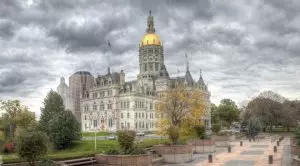 Connecticut’s way to gambling expansion is now open, after the Public Act 17-89 was finally signed by Governor Dannel Malloy. The piece of legislation clears the path for the long-desired Connecticut casino in East Windsor, with the Mohegan and the Mashantucket Pequot tribes being allowed to establish a satellite gambling venue.
Connecticut’s way to gambling expansion is now open, after the Public Act 17-89 was finally signed by Governor Dannel Malloy. The piece of legislation clears the path for the long-desired Connecticut casino in East Windsor, with the Mohegan and the Mashantucket Pequot tribes being allowed to establish a satellite gambling venue.
According to Governor Malloy, the piece of legislation signed by him would secure more jobs for the residents of Connecticut within the state. He also added that the state of Connecticut has been having a long-lasting partnership and compact with the local Indian tribal nations who provide jobs for thousands of residents of the state.
The Public Act 17-89 signing was a serious blow for the biggest opponent of the East Windsor casino – MGM Resorts. The latter is expected to open a luxury casino resort and entertainment complex in Springfield, Massachusetts in 2018, with the investment being estimated to $950 million. The company, which has stood against the East Windsor casino since day 1, revealed that it intends to fight the Connecticut casino expansion in court.
Speaking of the long-desired gambling expansion across the state, Governor Dannel Malloy has not yet put his signature under a bill that actually allows off-track betting or which prepares the legal and regulatory framework that would make sports betting legal within the state. Still, the signing of the Public Act 17-89 was necessary for the state to get the casino expansion through the Connecticut’s House of Representatives.
The proponents of the casino expansion project claimed that an eventual gambling expansion in the state, started with a joint venture casino project of the two Indian tribes – the MMCT Venture – would help the state keep a lot of jobs related to its gambling industry. In addition, the East Windsor casino expansion is considered one of the ways to stop further decline in the slot revenue generated by the Foxwoods and Mohegan Sun for the state.
Under the piece of legislation signed by the Governor, the state of Connecticut would receive 25% of slot revenue and 25% of revenue generated from all other games available at the third casino in the state. A total of 10% of these proceeds would be used in an effort to boost tourism in the state.
Also, an initial payment of $1 million would be made by the two Indian tribes to the State of Connecticut, as well as all costs related to regulatory monitoring and oversight that would be carried out by the Connecticut Department of Consumer Protection. The joint venture MMCT is expected to pay $300,000 on an annual basis that would be used to address problem gambling within the state.
At the times of the legislative hearings, MGM Resorts suggested that all potential operators should have the right to make proposals. Governor Malloy, on the other hand, has hinted that the casino expansion lead by the two Indian Tribes would have his support in case that Connecticut legislators chose to support the casino.
- Author


